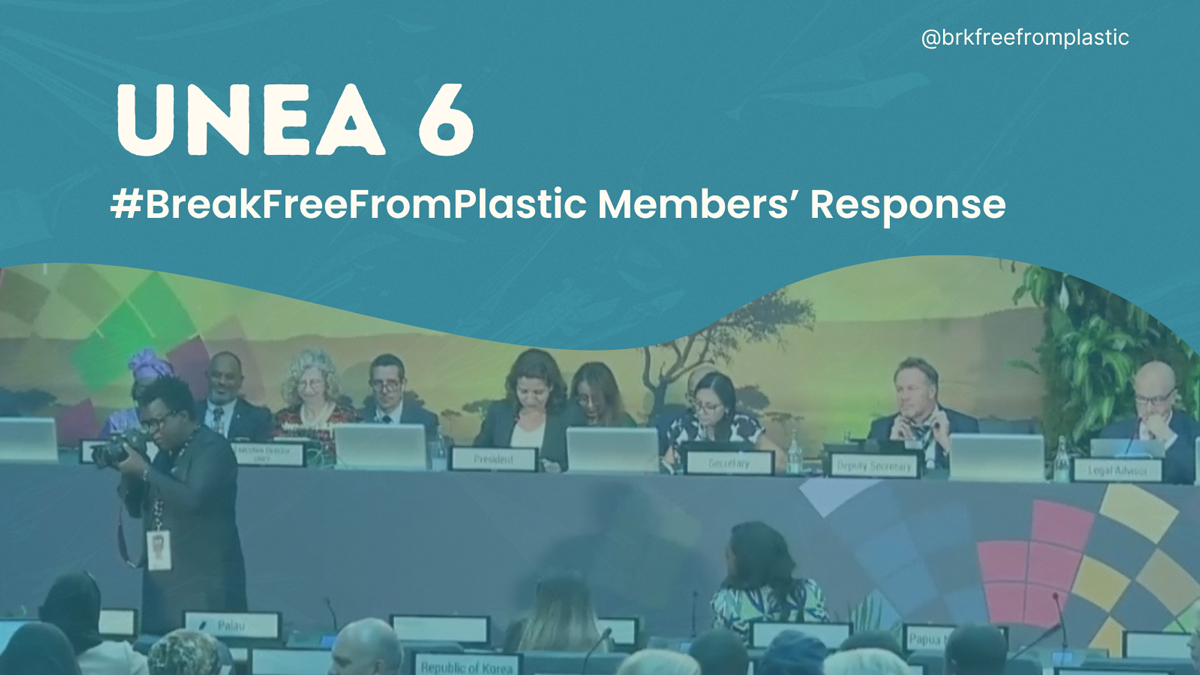March 1st, 2024, Nairobi - Today concluded the sixth UN Environment Assembly (UNEA 6), bringing representatives from 193 countries to Nairobi, Kenya, to consider proposals for “Effective, inclusive and sustainable multilateral actions to tackle climate change, biodiversity loss, and pollution.” After a week of discussions, #BreakFreeFromPlastic members on the ground continued calling for governments to push for an ambitious Global Plastics Treaty in preparation for the fourth round of negotiations that will take place in Ottawa, Canada, in late April.
Amid concern over attempts to limit the mandate of the plastics treaty during the week, Hellen Kahaso Dena, Project Lead of the Pan-Africa Plastics Project at Greenpeace Africa, said, "A few countries are attempting to water down the already agreed language on ending plastic pollution by 2040, reducing ambition on all fronts, and denying the link between chemicals and the climate crisis. We strongly urge member states not to undermine the mandate of the Global Plastics Treaty, and show courage and ambition as we continue the negotiations in Ottawa next month." –Read Greenpeace's full statement here.
David Azoulay, Director of the Center for International Environmental Law’s Environmental Health program, responded, “we welcome the renewed commitment to engage constructively in the ongoing negotiation of an international legally binding instrument on plastic pollution. Unsurprisingly, the same Member States who have worked to derail and obstruct the plastics treaty negotiations resort to a backdoor effort to attempt to renegotiate the INC’s mandate. While this declaration has no legal bearing on the mandate for the INC’s work, reaffirming the mandate at UNEA-6 is a valuable political statement in the face of continued bad-faith engagement by the United States and petrostates who are trying every means to limit the ambition of the future treaty. Governments need to respect their previous commitments and listen to the independent scientists and communities around the world who are demanding ambitious action. They must right the ship ahead of INC-4 to ensure the negotiations in Ottawa do not end in failure.” –CIEL's statement is also available here.
Ana Rocha, Director of Global Plastics Program for GAIA, added, "UNEA6 was a clear representation of the world’s political complexity and imbalance. When it comes to the Plastics Crisis, a handful of countries constantly tried to isolate and reduce the significance of resolution 5/14 that originated the Plastic Treaty negotiations. Thankfully, the commitment to urgently eliminate plastic pollution across the full lifecycle of plastics was once again reinforced in the Ministerial Declaration. We leave Nairobi with hope that the upcoming fourth round of negotiations in Canada will move us towards an ambitious Plastics Treaty."
Frankie Orona, Executive Director for Society of Native Nations also commented on the UNEA 6 meeting, "we found during UNEA 6 that many oil states tried to dilute, prolong and stop any progress related to the Global Plastic Treaty INC. We have found once again, an inequitable participation when it comes to including the voices of Indigenous Peoples, Frontline communities and workers, who are disproportionally impacted by the fossil fuel, petrochemical, agriculture and chemical industry. The issues in our impacted communities should not be considered just a human health and environmental issue but more of a human rights issue."
Rahyang Nusantara, Deputy Director of Dietplastik Indonesia, said, UNEA-6 was an opportunity to create a better strategy prior to the next INC-4 towards the Plastics Treaty. During side events and side meetings I was involved in, there was a lot of conversations on plastic pollution and especially around reuse as a solution, however I noticed a lot of different interpretations of the word. Reuse is not recycling and it is not only a packaging but also a system. Success of plastic reduction measures will depend on the scaling up of accessible sustainable alternatives. Reuse systems and refills are often the most sustainable option as compared to single-use substitutions and reuse systems should be material-agnostic. I look forward to more discussions and intersessional work to ensure that Reuse is central to achieving “Resolution 5/14 End plastic pollution: towards an international legally binding instrument”
On a separate note, BFFP member IPEN celebrated UNEA's call for action to end the use of the world’s most toxic pesticides by 2035, which continues to drive the connection across environmental issues and the petrochemical impacts on human health, including pesticides and plastics.
Additional BFFP's statements will be added as they become available.
###
About Break Free From Plastic – #BreakFreeFromPlastic is a global movement envisioning a future free from plastic pollution. Since its launch in 2016, more than 2,000 organizations and 11,000 individual supporters from across the world have joined the movement to demand massive reductions in single-use plastics and push for lasting solutions to the plastic pollution crisis. BFFP member organizations and individuals share the shared values of environmental protection and social justice and work together through a holistic approach to bring about systemic change. This means tackling plastic pollution across the whole plastics value chain—from extraction to disposal—focusing on prevention rather than cure and providing effective solutions.www.breakfreefromplastic.org




